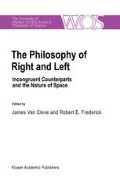Abstract
C. The concept of space is thus a pure intuition, since it is a singular concept. It is not put together from sensations, but is the fundamental form of all outer sensation. This pure intuition can be readily observed in the axioms of geometry, and in every mental construction of postulates or of problems. For that space has not more than three dimensions, that there is but one straight line between two points, that from a given point in a plane surface with a given straight line as radius a circle can be described, etc., are not inferred from any universal notion of space, but can only be discerned1 in space in the concrete. We cannot by any sharpness of intellect describe discursively, that is, by intellectual marks, the distinction in a given space between things which lie towards one quarter, and things which are turned towards the opposite quarter. Thus if we take solids completely equal and similar but incongruent, such as the right and left hands (so far as they are conceived only according to extension), or spherical triangles from two opposite hemispheres, although in every respect which admits of being stated in terms intelligible to the mind through a verbal description they can be substituted for one another, there is yet a diversity which makes it impossible for the boundaries of extension to coincide. It is therefore clear that in these cases the diversity, that is, the incongruence, cannot be apprehended except by pure intuition. Hence geometry employs principles which not only are unquestioned and discursive, but which are such as fall under the mind’s direct observation. Evidence in demonstrations (meaning thereby the Clearness of assured knowledge, so far as this clearness can be likened to that of sense) is found in geometry not merely in the highest degree, but is found there alone of all the pure sciences. Geometrical evidence is thus the model for, and the means of attaining, all evidence in the other sciences. For since geometry contemplates the relations of space, the concept of which contains in itself the very form of all sensual intuition, there can be nothing clear and perspicuous in things perceived by outer sense except through the mediation of the intuition which that science is occupied in contemplating. Further, geometry does not demonstrate its universal propositions by apprehending the object through a universal concept, as is done in matters of reason, but by submitting it to the eyes in a singular intuition, as is done in matters of sense.2
Access this chapter
Tax calculation will be finalised at checkout
Purchases are for personal use only
Editor information
Editors and Affiliations
Rights and permissions
Copyright information
© 1991 Springer Science+Business Media Dordrecht
About this chapter
Cite this chapter
Kant, I. (1991). Selection from Section 15 of Dissertation. In: Van Cleve, J., Frederick, R.E. (eds) The Philosophy of Right and Left. The University of Western Ontario Series in Philosophy of Science, vol 46. Springer, Dordrecht. https://doi.org/10.1007/978-94-011-3736-2_4
Download citation
DOI: https://doi.org/10.1007/978-94-011-3736-2_4
Publisher Name: Springer, Dordrecht
Print ISBN: 978-94-010-5661-8
Online ISBN: 978-94-011-3736-2
eBook Packages: Springer Book Archive

